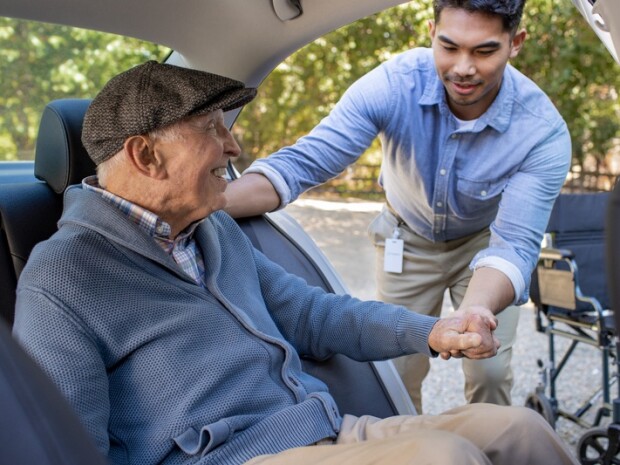Parkinson’s disease affects mood, memory, and balance, but it doesn’t have to affect quality of life. We can help you or your loved one live safely and happily at home.
Face your future with confidence—and optimism
Our caregivers are expertly trained to support the safety, health, and wellness of people with Parkinson’s. With our proprietary Balanced Care Method®, our care goes beyond basic help with daily activities by also focusing on engagement, passions, and purpose. We partner with our clients and their loved ones to create a future worth living well—no matter how the disease progresses.
We understand Parkinson’s and its challenges
Parkinson’s disease is sneaky. What often begins as a minor hand tremor can evolve into difficulty speaking and moving, jaw stiffness, amnesia, trouble swallowing, severe depression, and other life-threatening symptoms.
While this progressive nervous system disorder can’t be cured, it can be helped with the right care. Our deep understanding of Parkinson’s allows us to support you in doing activities that can slow the progression of the symptoms. Our caregivers are specifically trained to assist clients with Parkinson-related mood, memory, and physical issues.
While this progressive nervous system disorder can’t be cured, it can be helped with the right care. Our deep understanding of Parkinson’s allows us to support you in doing activities that can slow the progression of the symptoms. Our caregivers are specifically trained to assist clients with Parkinson-related mood, memory, and physical issues.



How we can help.
As the symptoms of Parkinson’s disease progress, so does the risk of injury, choking, and physical rigidity. We can support you and your loved one with line-of-sight supervision to minimize falls, and meal preparation and oversight while eating to reduce the potential for aspiration.
We also offer help with activities and behaviours that slow the symptoms of this disease. From keeping clients active and engaged to providing reliable medication reminders, our caregivers provide vital support to our clients with Parkinson’s disease, optimizing health, safety, and quality of life.
We also offer help with activities and behaviours that slow the symptoms of this disease. From keeping clients active and engaged to providing reliable medication reminders, our caregivers provide vital support to our clients with Parkinson’s disease, optimizing health, safety, and quality of life.
-
Companionship
-
Personal Care and Hygiene
-
Medication Reminders
-
Staying Active
-
Grocery Shopping
-
Light Housekeeping
-
Meal and prep nutrition
-
Social Activities and Connection
-
Transportation and Errands
-
Hobbies and Passion
Help us understand your care needs. Then we’ll set up a free phone consultation so you
can get the right support and services to live and age successfully at home.
can get the right support and services to live and age successfully at home.
We know that Parkinson’s disease affects an aging adult physically, emotionally, and mentally. But Parkinson’s also has an effect on family members. In order to prepare for the challenges that this life-changing disorder creates, it can help to understand some of the ramifications of Parkinson’s on family dynamics.
Alzheimer’s and Dementia Caregiving
The FAST scale assesses the “functional” or daily observable changes and symptoms associated with Alzheimer’s disease or other dementias — and it can provide a useful map, as well as much greater understanding of the process of decline. But did you know that family members and loved ones can use this tool as well?
Support your loved one’s desire to live independently with these essential home safety features, technology solutions, and support for household tasks.
Frequently Asked Questions
What’s the best home care?
The best home care is provided by reliable, professional caregivers who are trained and backed by a home care agency that’s insured, providing oversight, care guidance, and back-up caregivers as needed.
How do I find the best caregiver for my loved one?
The best caregiver is an experienced professional who has the training and skills to support your loved one’s care needs. It’s also important to find a caregiver who’s extremely reliable—has back-up if necessary—and is a good fit in terms of personality and shared interests.
Is home care better than moving to assisted living?
Nine out of ten older adults would prefer to live independently in the home they know and love rather than moving to a facility or assisted living community. With the right level of support, most people can continue to live safely and comfortably at home even as they age with a progressive illness or medical condition.
How much does home care cost?
Home care is typically billed by the hour, so the cost depends on the number of care hours per week and can vary slightly by region. Most families pay out-of-pocket for their care or use long-term care insurance.
Is a home care agency better than hiring a private caregiver?
If you value safety, security, and reliability, yes. A quality home care agency is insured and also manages the performance and scheduling of its caregivers, handles billing and payroll, and has back-up caregivers to fill in when needed. With a private hire caregiver, you’re responsible for setting up payroll and withholding taxes, caregiver vetting and background checks, and purchasing sufficient liability insurance to cover any accidents or injuries in the home.



